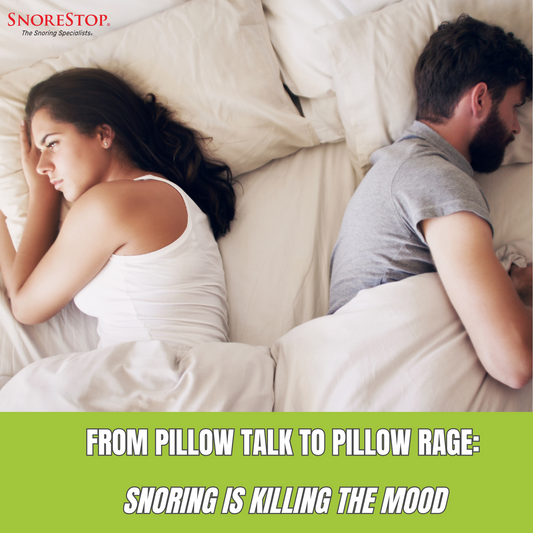
Understanding Snoring
What is snoring?
Snoring is the harsh, rattling sound produced when airflow is blocked causing the tissues in one or more airway(s) to vibrate during sleep. It happens when air can’t move freely through your airway(s), usually due to partial blockage or narrowing of the airways.
Though it’s often joked about, snoring is no laughing matter—especially when it becomes a nightly disturbance. Millions of adults snore, and for some, it’s a sign of something more serious like obstructive sleep apnea (OSA).
Why do people snore?
Snoring can be caused by a variety of reasons, both temporary and chronic:
-
Poor muscle tone or collapsed soft tissues in the mouth and/or throat
-
Obstructed nasal airways from allergies, colds, or structural problems
-
Being overweight, which increases fatty tissue around the neck
-
Sleeping on your back, which causes the tongue to block the throat
-
Use of alcohol or sedatives, which relax throat muscles too much
Types of snoring sounds
Snoring isn’t one-size-fits-all. It can vary by pitch, volume, and frequency. Some snorers emit soft, rhythmic purrs, while others produce explosive, thunderous growls that could shake the walls.
The type of snore may indicate different underlying issues. For instance:
-
Nasal snoring often suggests congestion or sinus issues (mouth is open)
-
Throat-based snoring is deeper and more serious, often linked to OSA
-
Tongue-based snoring can be positional, happening mostly when sleeping on the back.
How Snoring Affects Relationships
The emotional toll on couples
Snoring can drive a wedge between partners. Sleep is essential for emotional regulation and patience, and if one partner is deprived of quality sleep, tension, irritability, and resentment can build up quickly.
It’s not just about noise—it's about feeling ignored or unconsidered. Partners of chronic snorers often report feeling helpless or even angry, especially when their concerns go unaddressed.
Impact on intimacy and sleep quality
Sleep and sex often share the same space, and when one gets disrupted, the other suffers. According to the Sleep Foundation, snoring can reduce intimacy, drive couples into separate bedrooms, and create a cycle of isolation and disconnection.
Sleep-deprived partners may find themselves too tired for romance. Over time, the lack of closeness can severely damage the relationship.
Real stories from couples
Many couples have turned to forums like Reddit and health blogs to share their experiences. Stories range from gentle compromises—like using white noise machines or sleeping masks—to pillow rage, where frustration boils over during sleepless nights.
Common Causes of Snoring
Nasal congestion and allergies
Stuffed noses equal narrow airways. Whether it’s due to seasonal allergies, a cold, or a deviated septum, nasal congestion is one of the leading triggers of snoring.
Obesity and sleep position
Extra tissue around the neck and throat due to obesity can squeeze airways. Also, people who sleep on their backs are more likely to snore since gravity pulls the tongue back.
Alcohol, smoking, and medications
Alcohol and certain medications relax the muscles in the throat, increasing the likelihood of vibration. Smoking irritates the airways and causes inflammation, which can make breathing noisier.
The Science Behind Snoring
What happens in the airway
When you sleep, your muscles relax. In some people, this causes the tongue and soft palate to collapse backward, partially obstructing airflow. The vibration of these tissues is what causes the snoring sound.
How sleep stages influence snoring
Snoring tends to worsen during REM sleep, when muscle tone is at its lowest. That’s why it often gets louder or more erratic in the latter half of the night.
Identifying the Severity of the Problem
Occasional vs chronic snoring
-
Occasional snoring may happen due to a cold, congestion, or drinking.
-
Chronic snoring happens most nights and may signal a deeper problem.
Signs you need medical help
-
Gasping or choking during sleep
-
Loud snoring that disrupts your partner’s sleep
-
Morning headaches or dry mouth
-
Daytime fatigue or irritability
These signs could point to obstructive sleep apnea, a potentially dangerous condition.
The Link Between Snoring and Sleep Disorders
Snoring vs sleep apnea
Sleep apnea involves repeated pauses in breathing during sleep. It’s a serious disorder linked to high blood pressure, heart disease, and stroke. Snoring is one of its hallmark symptoms.
Learn more from the American Sleep Apnea Association.
Risks of untreated sleep disorders
Ignoring chronic snoring can lead to:
-
Cardiovascular disease
-
Cognitive decline
-
Mood disorders
-
Increased risk of accidents
Diagnosing Snoring: When to See a Doctor
Medical evaluation and sleep studies
A sleep specialist may conduct a polysomnography, a comprehensive sleep study that monitors breathing, oxygen levels, heart rate, and brain waves.
Questions doctors may ask
-
Do you wake up gasping for air?
-
Does your partner report loud, paused, or irregular snoring?
-
Do you feel tired during the day?
Your answers can help determine whether simple lifestyle changes or advanced treatments are needed.
Treatment Options for Snoring
Lifestyle changes
Many people can reduce or eliminate snoring through simple adjustments:
-
Weight loss: Shedding even a few pounds can decrease throat tissue.
-
Change sleep position: Side-sleeping prevents the tongue from blocking the airway.
-
Avoid alcohol before bed: Alcohol relaxes throat muscles and worsens snoring.
-
Stick to a sleep schedule: Regular sleep helps the body enter deeper, quieter rest phases.
CPAP
For those diagnosed with sleep apnea, treatment may include:
-
CPAP machines: Continuous Positive Airway Pressure (CPAP) devices keep the airway open with steady airflow. Although bulky, they’re highly effective.
Learn more from Mayo Clinic.
Surgical options
When non-invasive methods fail, surgical procedures may be recommended:
-
Uvulopalatopharyngoplasty (UPPP): Removes excess tissue in the throat.
-
Nasal surgery: Corrects structural blockages like a deviated septum.
Natural Remedies That Might Help
Home remedies and sleep hygiene
-
Elevate your head while sleeping
-
Use a humidifier to reduce airway dryness
-
Use a diffuser with a specific blend of essential oils to promote open airways
-
Practice tongue and throat exercises to strengthen muscles
Snoring and Mental Health
How sleep affects mood
Lack of restorative sleep due to snoring can lead to:
-
Mood swings
-
Irritability
-
Increased stress
This emotional strain not only affects the snorer but also their partner, creating a tense environment.
Anxiety, depression, and sleep deprivation
Chronic sleep disturbances are closely tied to depression and anxiety disorders. Addressing snoring can significantly improve mental well-being.
Tech and Tools to Combat Snoring
Anti-snore pillows
These specially designed pillows help maintain proper head and neck alignment, reducing the chances of airway obstruction.
Smart sleep trackers
Devices like Fitbit, Oura Ring, or Apple Watch can monitor sleep patterns and detect signs of snoring or apnea.
Sleep apps
Download a free app which can record snoring and suggest personalized solutions.
Conversations That Matter: Talking About Snoring with Your Partner
How to approach the topic
-
Choose a calm, non-confrontational time
-
Use "I" statements (“I’m struggling to sleep” vs “You’re keeping me up”)
-
Emphasize concern for health, not just noise
Avoiding blame and shame
Snorers often feel embarrassed or guilty. Supportive language builds trust and encourages treatment-seeking behavior.
Snoring in Women: A Silent Struggle
Gender differences in snoring
Although commonly associated with men, women snore too—especially after menopause. However, they're less likely to report it due to stigma.
Why female snorers are underdiagnosed
Cultural expectations and less obvious symptoms mean many women go untreated. Healthcare providers may overlook or misdiagnose sleep issues in women.
Myths and Misconceptions About Snoring
Busting common myths
-
Myth: Only older or overweight people snore
Truth: Anyone can snore, including fit young adults -
Myth: Snoring is harmless
Truth: You don't get the restorative sleep you need every night for your body to restore itself. Ignoring it, may lead to serious health issues like sleep apnea.
Truth vs fiction
Separating fact from fiction empowers individuals to seek help sooner and improve both health and relationships.
Frequently Asked Questions About Snoring
1. Is snoring always a sign of a serious health issue?
Not always. Occasional snoring can be harmless, but chronic or loud snoring may indicate sleep apnea.
2. Can losing weight really help reduce snoring?
Yes. Weight loss reduces fatty tissues in the neck, opening airways and decreasing snoring intensity.
3. What position is best for snorers to sleep in?
Sleeping on your side is generally best. Avoid lying on your back, which can cause the tongue to block the throat.
4. Are there effective over-the-counter solutions?
Yes. Natural solutions that help open the airway(s) , and anti-snore pillows can help mild snorers.
5. Can children snore too?
Absolutely. Persistent snoring in children may indicate enlarged tonsils or adenoids and should be evaluated.
6. Should I see a doctor for snoring even if I don’t feel tired?
Yes. If your snoring is loud and frequent, it’s worth checking for sleep apnea—even if you don’t feel fatigued.
Conclusion: Snoring Doesn’t Have to Be the End of Pillow Talk
Snoring may be common, but it doesn’t have to kill the romance. Whether you're the snorer or the partner of one, there are solutions, treatments, and lifestyle changes that can dramatically improve your nights and restore the harmony in your relationship.
With awareness, compassion, and the right strategies, you can turn "pillow rage" back into "pillow talk"—and maybe even catch some Zzzs while you're at it.








